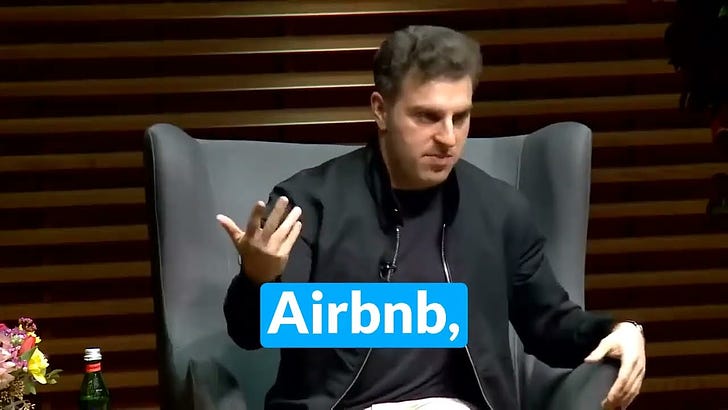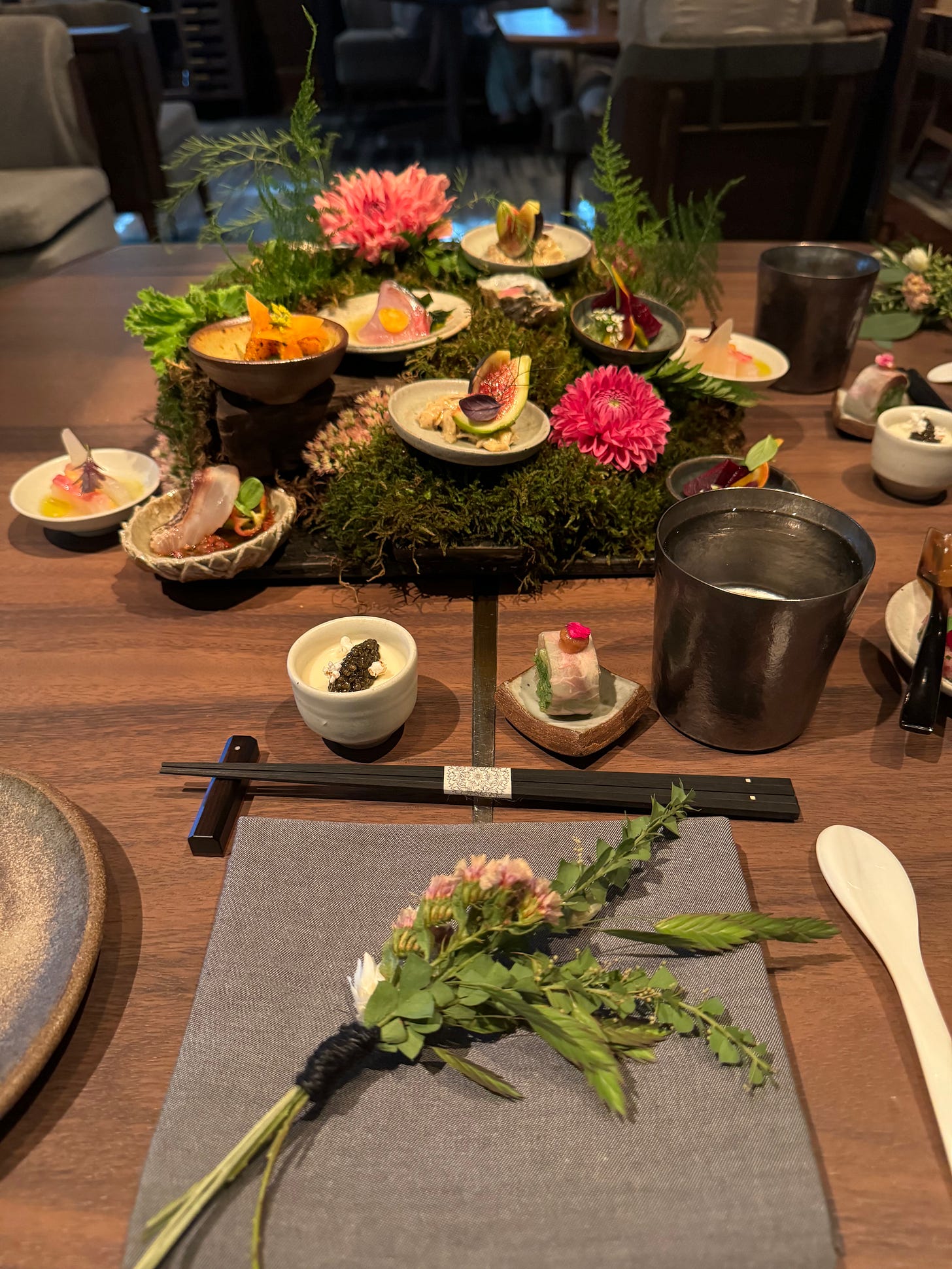Everyone seem’s to be talking about Founder Mode lately. Rather than pile on to the Founder Mode train, I’d like to talk about my personal favorite Brian Chesky ism. The 11-star experience.
If you have two minutes for some extra context, watch below:
In case you didn’t watch the video, Brian describes the 7-star experience for Airbnb (of the 11 stars) in the clip above as:
A 7-star experience is they get a limo, they pick you up at the airport and there’s this whole curated experience. You get to the house and they know you like surfing so there’s a surfboard waiting for you.
The 8th through 11th stars involve, among other things, elephants, five thousand screaming fans, and a rocket ship.
In essence, the 11 star experience is an exercise in thinking bigger. It forces you to ask yourself “What would a perfect experience look like?” then, once you have an answer, push yourself to go even bigger.
The reason that the 11-star experience is on my mind is because I was recently lucky enough to have dinner at Singlethread. My fiancée and I are big foodies so this was a major bucket lister for us. We had a special occasion so decided to treat ourselves and it certainly did not disappoint. This was a 11 star dining experience.
Some examples:
The host was waiting outside the restaurant and greeted myself and my fiancée by name as we approached. We did not yet introduce ourselves. I had not shared pictures of us. They just knew.
After we were seated, our waiter proceeded again to address us by name and ask us what we would like to drink - sparkling water or still water. No surprises so far. However, seconds later as our waiter explained the menu, our glasses were filled by other members of the staff with our preferred choice of water. At no point did our waiter call over to someone else on the team nor was anyone else within earshot. It felt like magic.
Finally, the presentation was beautiful. Every dish felt like art.
Beyond the big surprises, they did all of the little things right. When I asked where the restroom was, I was escorted the whole way to the restroom. They even opened the door for me. Necessary? Not really. Appreciated? Very much so. There were hundreds more examples of just doing the little things right over and over again.
The elements of the 11-star experience
The eleven star philosophy is all about surprise. These surprises can be a perfectly seamless experience, grand gestures, or actions against ones own self interest.
My Singlethread experience falls into the first bucket. Everything was seamless. So seamless that it almost felt magical.
When I think of grand gestures, I think again of restaurants. This time, it’s restaurants on TV. In Season 3 of the Bear, Richie apprentices in a fancy Chicago restaurant. He first complains and groans about how menial some of his tasks are, like polishing forks (although this is a critical part of a seamless experience). However, the prospect of creating a 11-star experience for guests quickly wins him over. This culminates in him sprinting across Chicago to get a Pequods1 Pie to bring to a customer who is moving away from Chicago but never had the chance to try.
The last pillar of a 11-star experience is making customer centric decisions that, in the short term, hurt you. Kyle Harrison recently wrote a great piece, “Against your own self-interest” where he said:
There were a few examples of this that came to mind. The first was a personal experience. I remember years ago, my brother and I were trying to buy a few pieces of workout equipment. We went to a sporting goods store looking for something, and the guy that helped us said, "you can get it here, but its going to be way more expensive and not the best fit. But they have exactly what you're looking for at Walmart."
I walked out of the store and commented to my brother, "that seemed dumb! That guy sent us away to shop at a different store, rather than spend money at his." My brother's response was immediate, and instructive. "I like that place way more now, knowing that they're not just trying to screw me over selling me the wrong thing." In 2004, my brother was already tuned into concepts like Jeff Bezos' "customer obsession."
As Kyle alludes to, customer obsession at the expense of short term self interest runs deep at Amazon. Jeff Bezos shared the following in his 2003 Letter to shareholders:
For instance, shortly after launching Amazon.com in 1995, we empowered customers to review products. While now a routine Amazon.com practice, at the time we received complaints from a few vendors, basically wondering if we understood our business: “You make money when you sell things—why would you allow negative reviews on your website?” Speaking as a focus group of one, I know I’ve sometimes changed my mind before making purchases on Amazon.com as a result of negative or lukewarm customer reviews. Though negative reviews cost us some sales in the short term, helping customers make better purchase decisions ultimately pays off for the company.
Customers don’t expect you to put their interests above your own - if you do, you’ll win them over for life.
Some non-consumer examples
Ok so this works for AirBnB, Amazon, and restaurants but can it really work for any business? It certainly can.
Some of my favorite B2B examples:
Brex sent a bottle of Champagne to startups that recently raised a round. Probably the only bottle of champagne they’ve ever received from a vendor and…it worked!

Ramp taking a product suggestion on X and shipping it 5hrs later. Any brand can comment on product feedback on social media but few (if any?) can execute that quickly. For a customer to have their product feedback become part of the product in 5hrs is magical
Slack’s Fair Billing Policy. They will automatically detect if a user is inactive and prorate credits towards your next payment for that user.
Other practical thoughts
Get to the magic quickly
When Brian talks about the 11-star AirBnB experience, it starts at the airport with a limo ride. Singlethread made my day magical before I walked in the door. Sam Blond sent Champagne to prospects before they’d ever heard about Brex. Setting the tone early matters.
Slater Stich at BCV encapsulates this in his post Making Magical Moments for your Software Customers:
The idea is not rocket science: Whatever is special about your product, whatever makes it 10x better than existing solutions — a new user needs to experience that as quickly and as frictionlessly as possible.
This is really about getting “full credit” for what you’ve built; if you’ve built a great product, the user needs to feel that viscerally.
You can’t bury the lead with magical moments otherwise your customer may never get there. And, if you make the first touch point magical, you get some leeway if you have a hiccup later on.
Consistency matters
Trying to create a magical experience in an ad hoc way creates a real cognitive load for a team. Having to think how to ‘wow’ a customer during each interaction is exhausting. Having systems (ie. we greet every customer by name at the door or we send every prospect a bottle of champagne) allows you to focus just on executing.
Consistency also means that every touchpoint must be great. Sales, marketing, customer success, product, and engineering all have to have 11-star DNA. If you wow the customer during the sales process but the product is clunky, it’s not going to matter. Single department led efforts aren’t enough.
It takes a consistent and collective effort to achieve the 11-star experience.
It starts with hiring
What doesn’t start with hiring? Figma’s Chief Product Officer, Yuhki Yamashita says:
If you need an OKR to convince someone to care about quality, you probably have the wrong team and you want to find people who just care inherently, right?
Systems are important but they don’t matter if you don’t have the right people in them.
The best time to start is when you’re small
Small companies are nimble and have the freedom to experiment more. They can also try things that don’t scale. These early experiments can inform the customer experience of the future even if they need to be modified to fit the company’s size.
Brian put this well in an interview with Reid Hoffman:
“I tell a lot of entrepreneurs who don’t have traction, I miss those times. Yes, it’s exciting to have traction, to have a company that has huge scale. But the biggest leaps you ever get are when you’re small. Another way of saying it is: Your product changes less the bigger you get because there’s more customers, more blowback, more systems, more legacy.
The longer you wait, the more inertia and process accumulates. Start small but don’t be afraid to go big.
Pequods is the best Chicago deep dish. I will die on this hill.






Interesting to think about how this would translate to a medical context. Easier to see from a concierge medicine standpoint but everyday primary care or ERs would be challenging. Also not necessarily the point of medicine to get "customers"? But more people coming back to the doctor reguarly = less disease overall which is the goal. Reducing friction points (insurance, scheduling, etc.) would be a good place to start in order to get medicine from 3 --> 4/5 star experience for most people and companies like ZocDoc do a good job of this. However going up from 5...hmm...